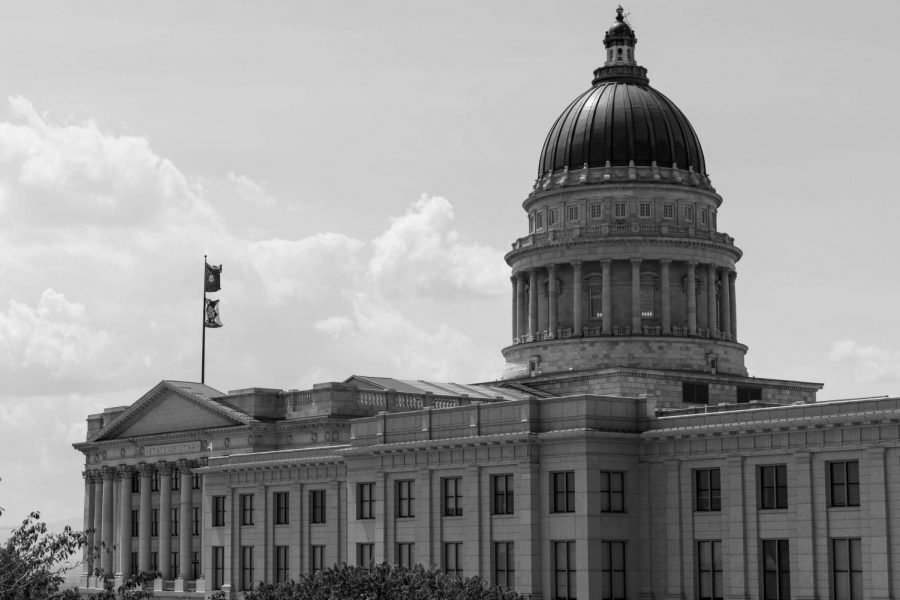Mendenhall: The Problematic Path of Banning Social Media for Kids
A view of the Utah State Capitol Building in Salt Lake City on Aug. 21, 2021. (Photo by Kevin Cody | The Daily Utah Chronicle)
February 10, 2023
Social media has been one of the more controversial topics this legislative session. There are several bills and amendments being considered within Utah’s state legislature, and at the national level as well. Some of these bills, such as H.B. 311 and S.B. 152, aim to put an age restriction on social media, and will make children under the age of 18 get explicit parental permission for accounts. This sounds like a solid idea, especially when you factor in kids’ mental health and how social media can affect it. However, there are downsides to enforcing additional age restrictions, as they might not be as practical or simple as we think.
Banning the usage of social media among teens without parental permission isn’t the right way to go about protecting their mental health.
H.B. 311 & S.B. 152
The sponsor for H.B. 311 is Rep. Jordan Teuscher and the sponsor for S.B. 152 is Sen. Michael McKell.
S.B. 152 discusses the regulations that would be imposed on social media companies themselves — even if parents sign off on their children having social media privileges, companies would be required to restrict access to direct messaging, search results, advertising or suggested content/other accounts. The idea of limiting search results and direct messaging is enticing, particularly when it can be so easy to navigate to other websites. This could definitely help reduce the exposure that kids could have to age-inappropriate content. However, H.B. 311 deals more with the overall usage and design of social media, and details of the fines and penalties that can be incurred for violation of the bill after its passing.
But what’s their plan with the threat of fines and penalties? It seems ridiculous that if a child signs up for social media without involving their parents, the social media company would have to pay penalties. It would also be ridiculous to make the parents pay, vice versa. In extreme circumstances, I understand why fines would likely be imposed. But that seems like a very situational, case-by-case basis.
Is This the Right Way?
It’s really important to try to find a solution to reduce the mental burden social media can have on children. With that said, asking for parental permission and policing kids’ every online move is certainly not the best solution. Children are constantly forging their parent’s signatures. Whether for a school field trip, disclosure document or planner, we’ve all either done it or known someone who has. That’s exactly what’s going to happen if these bills are passed. There’s not really any repercussions for forging signatures on minor documents. Unless there’s a significant amount of money or income lost, no legal action is taken. Although, kids might face the wrath of their parents.
This leads to another point: some children unfortunately live in situations where their home life may not be the best. So why would they even want to ask for an Instagram? This could be because a parent is out of the picture, not attentive or has potential substance abuse problems. Whatever the case may be, a child being afraid to ask their parents for permission for something so inconsequential seems pointless.
Using social media comes with general risks and benefits. Some of these risks, such as cyberbullying, sharing personal details and accessing inappropriate content, can affect children and their mental health more than others. According to the Salt Lake Tribune, Sen. McKell stated that, “We want to empower parents. We want to give them the tools necessary so they can monitor the social media accounts for their kids.” Nothing about this situation seems to be that empowering. We absolutely need to be working towards a solution for how to mitigate social media’s effect on the mental health of kids. However, the proposed ways are just going to cause more problems. The current legislation is either not going to be effective enough, or will just add more to the plate of parents.
The Chronicle did not hear back from Sen. McKell regarding an interview request.
Future Legislation
For the last few years, there’s been a giant push throughout the nation to implement tougher restrictions on who can access social media. In 2022, 34 state legislatures either implemented or introduced bills centered around moderating content individuals can see.
There’s many different kinds of bills around social media that are trying to be passed. Some are to prevent companies from censoring content or promoting hate speech. Others aim to protect children from social media addictions. One of the priorities between any legislative party is the vulnerability of children on the internet and using social media, which is awesome. We all know that “safety” features on social media platforms aren’t up to par, so dialing in on what can be done to increase safety measures is absolutely a step in the right direction.
We need to admit that the decline of children’s mental health is absolutely impacted by social media and the presence of cyberbullying, predators and addiction. However, the current bills that are to implement changes are not entirely thought through, and will either end up causing more harm than necessary, or will be pointless and irrelevant. Let’s focus on social media companies as a whole, rather than adding more responsibility to parents and families individually.












